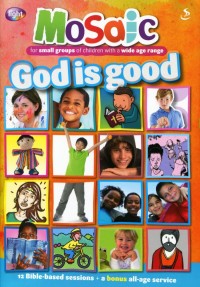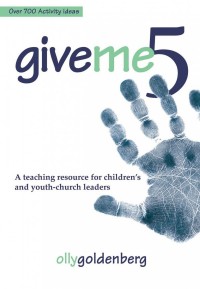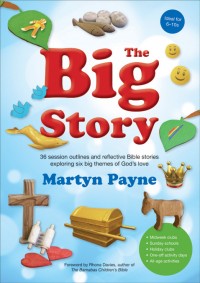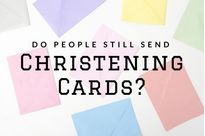Why is it that when a toddler and a teenager walk through the Sunday school doors your heart pounds in your chest and your knee’s begin to shake? But with the right approach, preparation, and resource your small group with a wide age range is in fact primed for Sunday school success. This informative article will help you to build a successful Sunday school group from a handful of 3-15 year olds with minimum effort and maximum effect.
If you’ve got the time to plan, organise, and prepare every lesson that’s fantastic. But not everyone is a superhero.
Thankfully there is a wealth of Sunday school resources available, and here are some specifically tailored for small groups with a wide age range.
Mosaic - God is Good

Age range: 3 – 14 years old.
How many sessions: 3 series with 6 lessons each.
Subjects covered:
- In God’s Hands: discover how God protects David in his early life (from 1 Samuel and the Psalms)
- Jesus Challenges Us: Jesus’ parables confront us with challenges about how we should live (from Matthew)
- Adventures with God: stories from the early chapters of Acts, finding out about our God who communicates (from Acts)
Helpful resources:
- Photocopiable Resources
- Extension Ideas that are age specific
- Case Studies designed to encourage you
- Helpful Advice from the Mosaic Clinic
- Access to the weekly up-dated online resource: LightLive
- Free All-Age Service based on Psalm 23
Key feature: Each session is packed with activities, giving you the control to pick and choice to make it your own. For more information and a PDF sample of the introdution and the first 3 sessions, veiw Mosaic - God is Good product page.
Give Me 5

Age range: 4 – 18 years old.
How many individual activities: Over 500.
Subjects covered: The activities in this book split in to five sections.
- Welcome - intro activities
- Worship - creative ideas for worship
- Word - Bible-focused activities
- Warfare - prayer-focued, interactive activities
- Witness - application to children's life
Helpful resources:
- Over 700 creative activities.
- Freedom to tailor-make your own teaching
- Great resource to supplement other resources
- Tried and tested in local churches for 10 years
- Reference book when your stick for ideas
Key feature: 'Give Me 5' the Bible of children’s activities. Piece them together into weekly sessions and your Sunday school will be fresh and fun each and every week. For more information, veiw the Give Me 5 product page.
The Big Story

Age range: 6 – 10 year olds.
How many sessions: 36 sessions split into 6 themes.
Subjects covered:
- Enemies and friends - God's longing for friendship with and between all people
- Dark and light - the first gift of creation and abiding reality of re-creation
- Famine and feast - the rhythm of abundance and shortage
- Death and life - God's heart for bringing life out of places of destruction
- Depths and heights - journeying with God from despair to joy
- Hide and seek - experiencing the immediate presence and apparent absence of God
Helpful resources:
- 36 highly creative and incredibly powerful stories
- Each session includes: opener, story, discussion questions, crafts, and a reflective task
- Includes a visual timeline of Bible history story
- This resource requires the teacher to make visual aids for each weekly story
Key feature: The Big Story places the emphasise on wondering, reflecting, and discussing the wonderfully told stories. Spiritual growth is fostered, for the child and the teacher. For more information and a PDF sample of the first two session, veiw The Big Story product page.
Some Practical Advice On Leading A Small Group With A Wide Age Range
Build Relationships
So you’ve only got a handful of children. You may think numbers are everything, but believe me, you’re the lucky ones.
When your numbers are small, building real relationships with each child is 100% easier. Instead of rushing around, telling children off, and panicking over lost children your time and energy becomes undivided.
You have the amazing opportunity to build a meaningful and lasting relationship, what a blessing!
Don’t Think ‘Class’, Think ‘Family’
Classes are a set of children grouped together because of their age and ability.
Families are brothers and sisters, young and old, working together despite their different abilities.
No matter where you go, younger children always look up to the older ones. Create a family environment, where the old help the young, where everyone is at different abilities, and where there is no right or wrong. Slowly but surely, your small group will change into a little family, supporting and loving each other.
Ask A Teacher
It may sound obvious, but I’m going to say it anyway. Make friends with primary school teachers.
Their weekday job is to teach kids. They plan 5 engaging lessons, teach them, and then do it all over again the next day. Find the primary school teachers in your congregation and turn them into your new best friend. Ask them for advice, ask them for resources, ask them to watch your lessons to give you feed back.
And if they don’t look too stressed out, ask them if they want to join in the fun.
Never Under Prepare
Fail to prepare, prepare to fail”. – Benjamin Franklin.
Just because you’ve got a handful of children doesn’t mean you can sit back and relax.
The more you prepare the more confidence you will have. The more you rehearse the more impact your words will have. The more structure your session has the more boundaries there will be to follow. The more stuff you plan the more flexibility you will have.
More is always better then less. Especially when working with kids.
The Main Ingredient: FUN
Always try and include something that will excite your children.
It doesn’t have to have the WOW factor. Perhaps walk to the local park, cook some cupcakes, decorate gingerbread men, or watch a youtube clip on your laptop. These are all things that you would never think of doing with a group over 15, but with your small group the possibilities are much wider.
Stay In The Loop
There’s nothing worse than strolling into church only to be thrust into to the Sunday school room with nothing but your Bible.
Or when you’ve stayed up all night planning the most amazing craft activity, only to find out the vicar is doing a family service and Sunday school is cancelled.
Communication is crucial to your sanity. Talk to your vicar. Pass on the information to your fellow teachers, parents, and children via phone, text, e-mail, or facebook. Now you can plan your rotas and termly teaching plan with full confidence.






